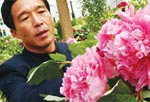Rise and shine
Updated: 2011-03-25 13:08
By Meng Jing (China Daily European Weekly)
"By developing a solar city, the Dezhou government is actually providing a local market for its local solar energy manufacturing industry," he says. The local market is ready for solar water heaters but not fully prepared for costly energy-saving buildings, he says.
"In order to cut down the production cost, Himin Solar needs to allocate enough research funds to upgrade solar technology," Meng says.
"However, the current market size for energy-efficient buildings is not big enough to attract profit-driven investors."
Baoding city, Hebei province
Baoding, a little-known city in North China's Hebei province, is also a big name in China's solar industry.
The city is known as the birthplace of Yingli Solar, China's first solar panel maker, and the first city in China to come up with the idea of building a solar city.
Efforts in industry and the government for the country to go low carbon helped put Baoding on the list of a World Wildlife Fund (WWF) low-carbon city initiative in 2008, making it one of the two Chinese cities on the pilot project.
Baoding's status may not be as important as the international hub of Shanghai, the other Chinese candidate on the pilot project, but government cooperation has been a crucial factor in pushing the project forward, says Lei Hongpeng, senior program officer of climate and energy with WWF China.
Since 2007, Baoding authorities have installed 1,400 solar power road lamps and upgraded the lighting systems in 100 traffic crossroads as well as 150 residential communities, saving 2,100 kWh annually.
The local government also announced plans to cut carbon emissions by up to 48 percent for each unit of GDP by 2020, even higher than the central government's 45-percent goal.
"The target to cut carbon emissions leads to demand for clean energy devices, which needs a strong industrial base for support. Baoding happens to have that support," Lei says.
Starting from a factory with an annually production capacity of 3 mW, Yingli Solar has grown into a global solar player, selling 1,061.6 mW in 2010 and maintaining the highest profit margin in the industry.
Ma Xuelu, chief strategy officer with Yingli Solar, attributes Yingli's success to its technological innovation and its full supply chain. The company is the only solar cell producer in China which produces polycrystalline silicon, the primary material in solar cells, itself.
Unlike Dezhou's solar industry that depends on one leading company, Baoding's solar industry rests on the development of Baoding National Development Zone, the only national-level industrial zone in China focusing on clean energy.
About 170 companies in solar energy and wind power have started operations in the zone, out of which many occupy leading positions in the country's clean energy sector, according to the administrative committee of the Baoding National Development Zone.
The industrial zone has offered many preferential policies to help companies speed up technological innovation. In 2010, more than 1 billion yuan of funds were invested to support 30 research and development centers in the zone.
However, maintaining its leadership in China's booming clean energy industry will be a big challenge for Baoding in the next five years.
More than 100 cities in 18 provinces in China have eyed the potential of the clean energy market and made plans to build their clean energy industry.
Ma Xuelu, of Yingli Solar, says the key for Baoding to survive in the fierce competition is to keep its edge in technology and in its talent.
Baoding is located close to Beijing, Tianjin and Shijiazhuang, capital of Hebei province, making it hard to attract talent.
The administrative committee of the Baoding National Development Zone is aware of the problem. Zhang Hui, a press officer with the committee, says that offering preferential policies to attract oversea-educated returnees has already been factored into the five-year plan of the zone.
E-paper

Rise and shine
The Chinese solar energy industry is heating up following recent setbacks in the nuclear sector
Bombs aim for regime change
CSI, with a twist
Literary path
Specials

Peony express
Growers of china's unofficial national flower are reaching out to europe for help

Tea-ing up
More turning to Chinese tea for investment opportunities like vintage wine

A cut above
The ancient city of Luoyang is home to a treasure trove of cultural wonders.
